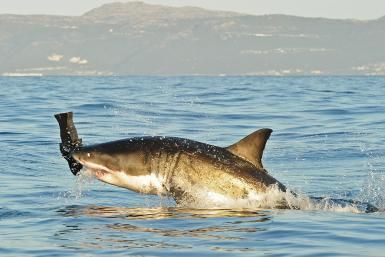Massive Great White Shark Rips 4-Foot-Long Black Tip Cousin, Photo Shows

A massive 14-foot-long shark was photographed devouring a 4-foot-long black tip shark, showing the cannibalistic nature of the great white shark. The Virginia Institute of Marine Science (VIMS) took the photo Friday during a longline fishing survey.
Several researchers witnessed the brutal attack about 3 miles off the coast of Sandbridge.
Researchers said the crew scrambled to save the other sharks they caught while the great white ripped off the black tip. The sharks caught by the institute are tagged and released.
"We weren't expecting that one," researcher Kaitlyn O'Brien, who took photos, told the Virginia Pilot.
Shark Survey, which is one of the longest-running fishery-independent studies of shark populations in the world, was started by VIMS in 1973. This survey began after significant declines in shark populations due to overfishing.
Friday's survey was the second in two days when the team encountered a great white shark.
"When the second one came up, we noticed that lines were all tangled," O'Brien said. An 8-foot-long immature male great white shark was assessed just a day before the attack.
According to reports, this was only the fifth great white shark captured by the program in its 45-year history.
Professor Rob Latour, who directs the Shark Monitoring and Assessment Program at VIMS, said: "It's a rare occurrence, but not really any more meaningful than seeing two pink cars going down the road... Unfortunately, observing a rarely seen shark often comes with a negative or fearful connotation, but the risk hasn't really increased. The animals have always been there, and taking a few commonsense precautions minimizes a risk that's already very low."
The Facebook post by VIMS read:
"The one that got away"
VIMS Longline caught another white shark today 3.5 miles off of Sandbridge. Lost at the boat before we were able to get the shark on board. For size reference the small shark was 4 feet. We estimated the mature male great white at 12-13 feet!
"Boy did he make a mess of our line!"
At this station we caught sharks on 41 out of 100 hooks.
Sharks play a key role in marine ecosystems worldwide. At the Virginia Institute of Marine Science, systematic study of mid-Atlantic sharks began in 1973 with the VIMS Shark Survey, which now stands as the one of the longest-running fishery-independent studies of shark populations in the world. This longline survey brought global attention to significant declines in shark populations due to overfishing, and led to the first U.S. management plan for sharks, in 1993. As fishing regulations help shark populations rebound in U.S. waters, data from shark research programs at VIMS continue to inform stock assessments and fishery management plans at federal and state levels.
© Copyright IBTimes 2024. All rights reserved.





















